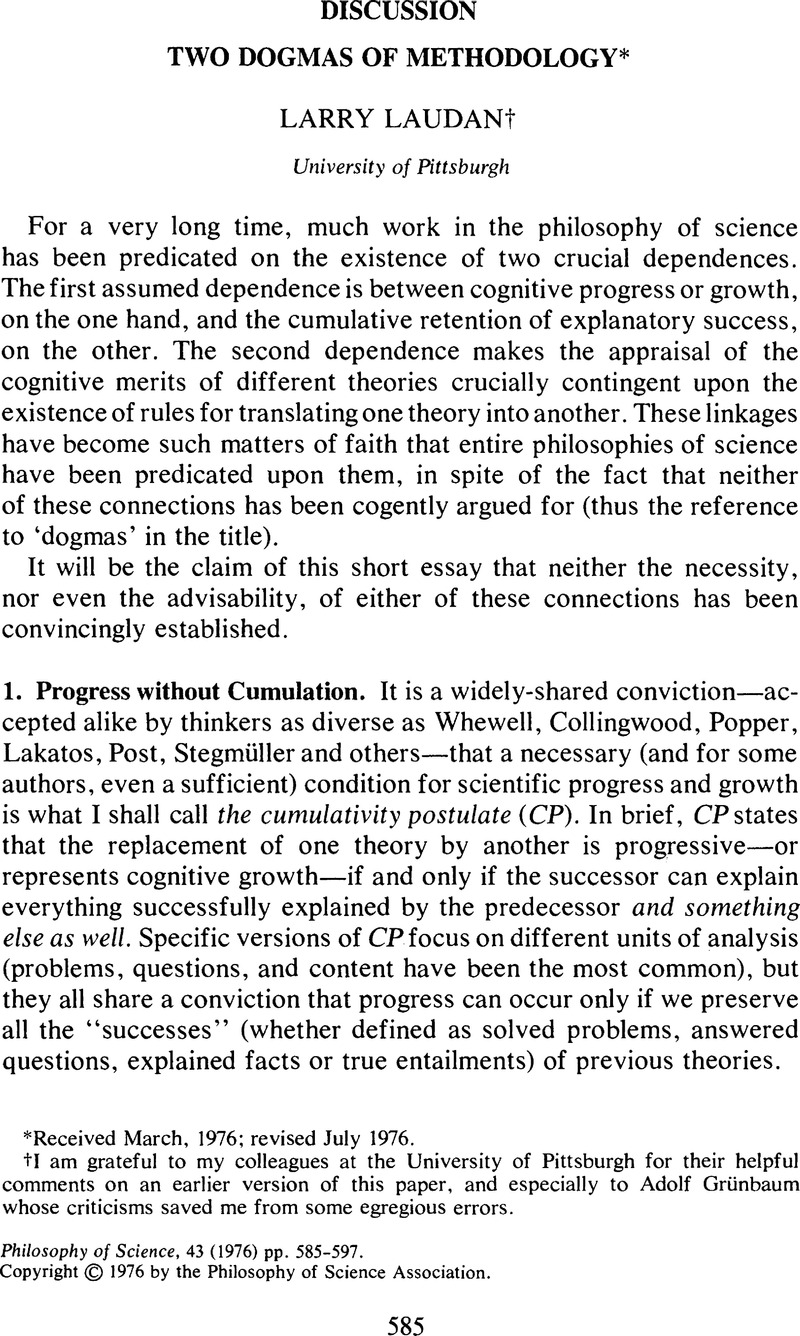Crossref Citations
This article has been cited by the following publications. This list is generated based on data provided by Crossref.
Tuomela, Raimo
1978.
On the structuralist approach to the dynamics of theories.
Synthese,
Vol. 39,
Issue. 2,
p.
211.
Laudan, Larry
1978.
The Philosophy of Progress….
PSA: Proceedings of the Biennial Meeting of the Philosophy of Science Association,
Vol. 1978,
Issue. 2,
p.
530.
Caplan, Arthur
1978.
Babies, Bathwater and Derivational Reduction.
PSA: Proceedings of the Biennial Meeting of the Philosophy of Science Association,
Vol. 1978,
Issue. 2,
p.
357.
Doppelt, Gerald
1978.
Kuhn's epistemological relativism: An interpretation and defense.
Inquiry,
Vol. 21,
Issue. 1-4,
p.
33.
Moberg, Dale W.
1979.
Are There Rival, Incommensurable Theories?.
Philosophy of Science,
Vol. 46,
Issue. 2,
p.
244.
SIEGEL, HARVEY
1980.
OBJECTIVITY, RATIONALITY, INCOMMENSURABILITY, AND MORE.
The British Journal for the Philosophy of Science,
Vol. 31,
Issue. 4,
p.
359.
Leplin, Jarrett
1980.
Scientific Discovery, Logic, and Rationality.
Vol. 56,
Issue. ,
p.
267.
Wykstra, Stephen J.
1980.
Toward a Historical Meta-Method for Assessing Normative Methodologies: Rationability, Serendipity, and the Robinson Crusoe Fallacy.
PSA: Proceedings of the Biennial Meeting of the Philosophy of Science Association,
Vol. 1980,
Issue. 1,
p.
210.
Kordig, Carl R.
1980.
Discussion: Progress Requires Invariance.
Philosophy of Science,
Vol. 47,
Issue. 1,
p.
141.
Cornman, James W.
1980.
Skepticism, Justification, and Explanation.
p.
196.
Laudan, Larry
1981.
A Confutation of Convergent Realism.
Philosophy of Science,
Vol. 48,
Issue. 1,
p.
19.
Rohrlich, Fritz
and
Hardin, Larry
1983.
Established Theories.
Philosophy of Science,
Vol. 50,
Issue. 4,
p.
603.
Moser, Paul K.
1985.
Empirical Justification.
p.
29.
Pera, Marcello
1985.
Change and Progress in Modern Science.
p.
267.
Josephson, John R.
1989.
Inference to the best explanation is basic.
Behavioral and Brain Sciences,
Vol. 12,
Issue. 3,
p.
477.
Bereiter, Carl
and
Scardamalia, Marlene
1989.
When weak explanations prevail.
Behavioral and Brain Sciences,
Vol. 12,
Issue. 3,
p.
468.
McCauley, Robert N.
1989.
Acceptability, analogy, and the acceptability of analogies.
Behavioral and Brain Sciences,
Vol. 12,
Issue. 3,
p.
482.
Feldman, Jerome A.
1989.
What's in a link?.
Behavioral and Brain Sciences,
Vol. 12,
Issue. 3,
p.
474.
Reggia, James A.
1989.
Measuring the plausibility of explanatory hypotheses.
Behavioral and Brain Sciences,
Vol. 12,
Issue. 3,
p.
486.
Cheng, P. C.-H.
and
Keane, M.
1989.
Explanatory coherence as a psychological theory.
Behavioral and Brain Sciences,
Vol. 12,
Issue. 3,
p.
469.



